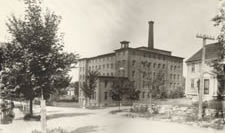Tonight, the 30th annual News & Documentary Emmy Awards were presented by the National Academy of Television Arts & Sciences in a ceremony at New York’s Lincoln Center.
As an historical consultant on the PBS documentary Traces of the Trade: A Story from the Deep North, I was nominated, along with my fellow researchers, for an Emmy for “Outstanding Individual Achievement in a Craft: Research.”
While we didn’t win, it was truly an honor just to be nominated, and I congratulate Salimah El-Amin and Blair Foster of HBO’s Taxi to the Dark Side for their accomplishment. Their film examines how the U.S. has treated detainees in Afghanistan, Iraq, and Guantanamo Bay, focusing on compelling research into the apprehension of an innocent taxi driver by U.S. forces and the circumstances leading to his eventual death at Bagram Airfield.
We are quite pleased that our nomination has helped to raise the visibility of Traces of the Trade, and has highlighted the importance of its historical subject matter.
Our research revealed for the first time that James D’Wolf was the leading slave-trader in U.S. history, and that his family were collectively the leading slave-trading family in our history. The D’Wolf family carried out at least 96 slaving voyages, bringing some 11,455 enslaved Africans to the Americas.
By my calculations, there may be more than 500,000 people alive today who are descended from those brought across the Middle Passage on D’Wolf slave ships.
The film raised much broader issues than our family’s history, however. This family’s involvement in the slave trade in many ways represents, in miniature, the American slave-trading experience. Our research into the family’s history has shed new light on the ways in which American slave traders operated, and the deep connections between their economic activities and the rest of American society. The research summarized in the film heightens our understanding of the role of the north in slavery and the slave trade, and emphasizes the centrality of slavery in American history. These are themes which I am exploring in more detail, and which I will begin presenting at the African Studies Association conference in New Orleans this fall.
Click here to read the rest of this entry
 “Quick Takes” features brief summaries of recent news, opinion, and research related to race, privilege, and inequality, with a special focus on the history and legacy of slavery and race, which are at the heart of The Living Consequences.
“Quick Takes” features brief summaries of recent news, opinion, and research related to race, privilege, and inequality, with a special focus on the history and legacy of slavery and race, which are at the heart of The Living Consequences.

 Slavery in New England was brutal and lasted, in its official form, for 150 years. Enslavement greatly enriched the colonists and, later, citizens of New England, and only died out gradually and fitfully.
Slavery in New England was brutal and lasted, in its official form, for 150 years. Enslavement greatly enriched the colonists and, later, citizens of New England, and only died out gradually and fitfully.